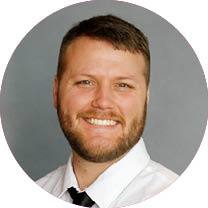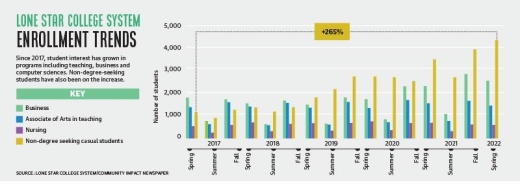Valerie Jones, associate vice chancellor of academic affairs at the LSCS, said incoming students have shown a greater interest in health care, education and business as fields for starting a career. Jones said the enrollment changes act as an indicator of where students are seeing the greatest financial value.
Enrollment data provided by the LSCS shows the number of students seeking business degrees, either as an Associate of Arts degree or as a field of study, have increased by about 60% since 2017. In fall 2017, 1,808 students were enrolled in the business Associate of Arts or field of study category. In the fall 2021 semester, there were 2,893.
“They are intending to be business majors at a university,” Jones said. “I saw that as a really telling increase as to where the market demand was for those students.”
Jones noted there has also been increasing interest and demand in the LSCS nursing associate program. However, due to the limited number of spots available with hospital systems for clinical sites, the enrollment cannot increase dramatically.
“We have twice as many applicants as we have spots,” Jones said.
According to the LSCS, the biggest change over the past five years has been the increase of non-degree-seeking casual students from 1,178 students in fall 2017 to 4,265 students in spring 2022.
“Students who take classes but do not intend to seek a credential are in the casual category,” Jones said.
Enrollment data from LSCS shows “non-degree-seeking casual student” has become the third-most enrolled program over the past five years, following the Associate of Arts and Associate of Science degrees.
The program enrollment changes are similar with surrounding universities as well. Transfer data from 2021 indicates the top university that LSCS students go to is the University of Houston, and student headcount data shows the three largest changes in program enrollment are the Bachelor of Science in health, teaching and learning, and computer science.
The bachelor’s in health has seen the most growth since 2017, increasing from 302 to 1,158, a 283% increase. Jones added the technical and business fields at the LSCS are continuing to grow, and programs such as business, cybersecurity and technology are also seeing increases.





